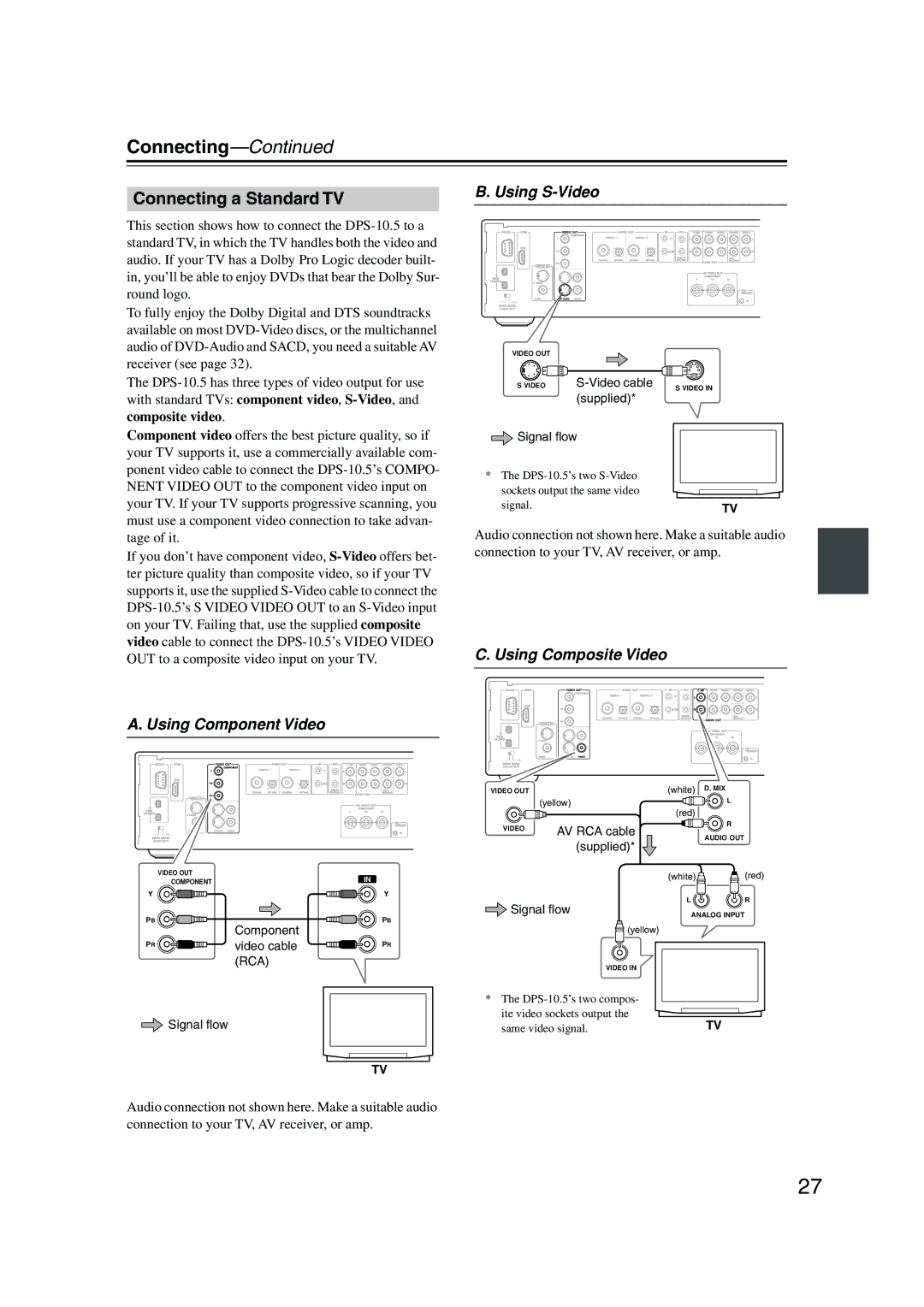DPS-10.5
Important Safety Instructions
For U.S. model
Precautions
Precautions
For models having a power cord with a polarized plug
If in any doubt, consult a qualified electrician
Moisture condensation may damage this unit
Never Touch this Unit with Wet Hands
Contents
Specifications
Important Safety Instructions Precautions
Initial Setup Basic Playback
Configuring the DPS-10.5
Introduction
DPS-10.5 Features
Cable
Supplied Accessories
Power-plug adapter
Introduction
DVD-Video Regions
Unsupported DVD Features
Disc Notes
Supported Discs
Function Support
Disc Content Organization
Video CDs
MP3 & Jpeg Compatibility
Copyright
Cleaning Discs
Handling Discs
Storing Discs
Terminology
Hdmi High Definition Multimedia Interface
Jpeg Joint Photographic Experts Group
Vlsc Vector Linear Shaping Circuitry
MPEG1 Moving Picture Experts Group
Compressed digital video format used for VCDs
MPEG2 Moving Picture Experts Group
Installing the Remote’s Batteries
Using the Remote Controller
Before Use
Front Panel
Getting to Know the DPS-10.5
Display
Getting to Know the DPS-10.5
Rear Panel
MIX Audio OUT 27, 28
Surr Mode Audio OUT switch
Supplied power cord should be connected here
IR IN/OUT
Controlling the DPS-10.5 DVD Mode
Remote Controller
Pause button
Setup button
Resolution button
Previous/Next
Controlling an Integra AV Receiver Amp Mode
Optical Digital Outputs
Connecting
AV Cables & Connectors
Before Making Any Connections
Video Formats & DPS-10.5 Inputs & Outputs
Connecting
DPS-10.5 audio output Disc type Audio format
Audio Formats & DPS-10.5 Outputs
Video Output Connections
Getting Connected
Connecting a Standard TV
Using Component Video Using S-Video
Using Composite Video
Connecting an Hdtv or Projector
Connecting a Component with an Hdmi Input
What is HDMI?
Audio Formats
Using Hdmi
Hdmi & the DPS-10.5
Video
Connecting an AV Receiver’s video Inputs
Using Component Video
AV receiver
Using i.LINK
Connecting i.LINK-compatible Components
What is i.LINK?
What is i.LINK Audio?
Link cables
Connecting to an AV Receiver’s Audio Inputs
Connecting Several i.LINK Components
Digital Audio Connection Dolby Digital & DTS
Analog Audio Connection Dolby Digital, DTS, DVD-Audio & Sacd
Stereo amp
Digital Connection
Analog Connection
Only one connection
About the HD Component Video OUT
Compatibility of this unit with progressive-scan TVs
Satellite/cable tuner, etc
Integra AV receiver
Connecting Components with
Controlling the DPS-10.5 When It’s Out of Range
Controlling Components That Are Out of Range
Controlling Other Out-of-range Components
Connecting the Power Cord
Press the Standby/On button
Turning On the DPS-10.5 with the Remote Controller
Press the DVD Mode button to select DVD mode
Turning On the DPS-10.5
Then press Enter
Initial Setup
First Time Setup
Use the Up and Down
Initial Setup
Loading Discs
Basic Playback
Pause To pause playback, press
Starting, Pausing & Stopping Playback
Basic Playback
Start To start playback, press the Play Button
Play the menu
Navigating Disc Menus
Load a DVD-Video disc or VCD
Pressing the Top Menu button
Load a DVD-Video disc
Selecting Chapters & Titles by Number
Use the number buttons to spec
Ify a chapter or title number
Selecting Tracks by Number
Frame-by-Frame Playback
Fast Forward & Reverse
Slow-motion Playback
Adjusting the Display Brightness
Navigating MP3 Discs
Viewing a Slideshow of Jpeg Images
Making a Playlist with the Disc Navigator
To stop the playlist, press
To start the playlist, select any
Item in the Track list except
Top folder and press the Play
Advanced Playback
Zooming
Time Search
Repeat Playback
Advanced Playback
Off
To cancel random playback, use the Random button to select
Random Playback
Load a disc
Items to the Memory List
Remote controller the Play button
Memory Playback
Press the Enter button
Deleting Items from the Memory List
Inserting New Items into the Memory List
Changing Items in the Memory List
Selecting Camera Angles
Selecting Soundtracks
Selecting Subtitles
Displaying Information
Last Memory
3rd press
Condition Onscreen DPS-10.5 Display Normal
1st press
2nd press
1st pressb
VCD & CD
4th press
Condition Onscreen DPS-10.5 Display
Setting the Hdmi Output Resolution
Selecting the Video Input Source
Turning Off the Video Circuits
Remote controller The Picture Control menu appears
Using the Picture Control Menu
Setting the Picture’s Aspect Ratio
Press the remote controller’s
Menu Setting Description Picture
Configuring the DPS-10.5
Language
Menu Setting Description Display
Configuring the DPS-10.5
Operation
Using the Onscreen Setup Menus
Arrow button
Following diagram shows
Configuring theDPS
Blank screen
Interlaced Setting
Picture Menu
TV Shape
Progressive Setting
Selecting the Interlaced Setting
PAL Output Setting Australian model only
Audio Menu
Digital Out/Digital1 i.LINK
Digital 2 Audio OUTs are on
Link Output Setting
Digital Out/Digital2 Hdmi
Linear PCM Out
Channel
Multi Channel default
Test tone is used to adjust the level of each speaker see
Analog Audio Out
Setting the Speaker Settings
Buttons to select an option
Setting the Speaker Distances
Small default Select if the surround speakers are small
Setup button to exit setup, or
Buttons to select Test Tone,
Setting Levels With the Test Tone
AV Synchronization
Selecting the AV Synchronization
Remote controller The settings are stored
Sacd Audio Setup
CD Audio Setup
Buttons to set the delay time
Audio Language
Language Menu
On-Screen Language
Disc Menu Language
Operation Menu
Display Menu
Select Parental Lock-On,
Remote controller The Security Code box appears
Parental Lock
Remote Confirmation
Selecting Other Languages
Initial Setup Menu
Priority Contents
Auto power off
Language Code List
Use this list when specifying other languages
Language Code
Controlling Other Components
Entering Remote Control Codes
Controlling Other Components
Remote Control Codes
RCA
Noblex
Controlling a VCR
Press the TV Mode button
Press the VCR Mode button
Controlling a TV
Mode
Learning the Commands of Other Remote Controllers
Deleting the Learnt Commands of All Modes
Deleting the Learnt Commands of One Mode
Symptom Possible cause Remedy
Troubleshooting
Troubleshooting
Restoring the Default Settings
Abnormal Behavior
Specifications
Specifications and features subject to change without notice
3 4 3 6 5

![]() Signal flow
Signal flow![]() Signal flow
Signal flow![]() (yellow)
(yellow)